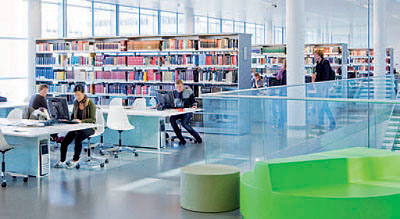

Strategic action lines
Consortia agreements
DEFF’s purchasing cooperation on electronic journal subscriptions and databases means an administrative relief for the individual library. The cooperation also gives the individual library the chance to enter into consortia with other libraries about the purchase of certain information resources.
The consortia agreements make it possible for all the participating libraries to gain access to the collective number of each library’s subscriptions without having to pay for all the journals. It is important because analyses of the usage show that researchers and students to a great extent use articles that are outside the institutions’ own subscriptions. This indicates a considerable interdisciplinarity within the institutions’ fields of activity and underlines the advantage in making consortia agreements.
The Wiley agreement is an example of Big Deal agreement. Via the consortia agreement the individual institutions get access to the collective number of titles. The DEFF license secretariat annually negotiates 250 license agreements for 200 institutions in Denmark.
Open Access
Bearing in mind the large investments in research it is important to promote free access to publicly financed research. This is i.a. done by supporting initiatives within Open Access, including encouraging the institutions to formulate publishing policies that further this objective.
DEFF supports open access-publishing through membership of SPARC. DEFF is moreover generally a central player in the Danish Open Access cooperation and contributes to the international Open Access endeavour.
Integrated search
The basis for integrated search is that data from many sources are collected and processed so that search engines can search in data and immediately afterwards present them to the user in a structured and uniform way. This collection of data is called a data well which to the greatest possible extent is made available to all libraries in DEFF. This work is complicated and technically demanding, and DEFF therefore supports joint cooperation within this area.
”The library has multiple identities. It is a building or buildings on campus. It is collections. It is a set of services delivered in a variety of ways. It is a group of people with particular expertice. Communicating this full spread effectively is difficult but increasingly important.”
Lorcan Dempsey, Vice President and Chief Strategist of the Online Computer Library Center (OCLC), from interview in connection with the project Fremtidens biblioteksbetjening af forskere

This page forms part of the publication 'Denmark’s Electronic Research Library' as chapter 4 of 6
Publication may be found at the address http://www.bibliotekogmedier.dk/fileadmin/publikationer/publikationer_engelske/deff/profile/index.htm
© 2009